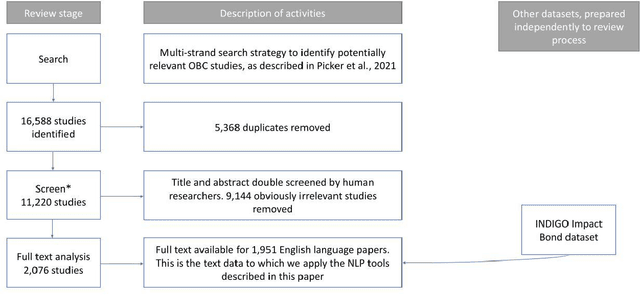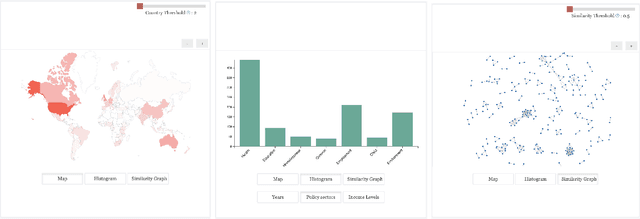Felix-Anselm van Lier
Machine Learning Information Retrieval and Summarisation to Support Systematic Review on Outcomes Based Contracting
Dec 11, 2024Abstract:As academic literature proliferates, traditional review methods are increasingly challenged by the sheer volume and diversity of available research. This article presents a study that aims to address these challenges by enhancing the efficiency and scope of systematic reviews in the social sciences through advanced machine learning (ML) and natural language processing (NLP) tools. In particular, we focus on automating stages within the systematic reviewing process that are time-intensive and repetitive for human annotators and which lend themselves to immediate scalability through tools such as information retrieval and summarisation guided by expert advice. The article concludes with a summary of lessons learnt regarding the integrated approach towards systematic reviews and future directions for improvement, including explainability.
SyROCCo: Enhancing Systematic Reviews using Machine Learning
Jun 24, 2024



Abstract:The sheer number of research outputs published every year makes systematic reviewing increasingly time- and resource-intensive. This paper explores the use of machine learning techniques to help navigate the systematic review process. ML has previously been used to reliably 'screen' articles for review - that is, identify relevant articles based on reviewers' inclusion criteria. The application of ML techniques to subsequent stages of a review, however, such as data extraction and evidence mapping, is in its infancy. We therefore set out to develop a series of tools that would assist in the profiling and analysis of 1,952 publications on the theme of 'outcomes-based contracting'. Tools were developed for the following tasks: assign publications into 'policy area' categories; identify and extract key information for evidence mapping, such as organisations, laws, and geographical information; connect the evidence base to an existing dataset on the same topic; and identify subgroups of articles that may share thematic content. An interactive tool using these techniques and a public dataset with their outputs have been released. Our results demonstrate the utility of ML techniques to enhance evidence accessibility and analysis within the systematic review processes. These efforts show promise in potentially yielding substantial efficiencies for future systematic reviewing and for broadening their analytical scope. Our work suggests that there may be implications for the ease with which policymakers and practitioners can access evidence. While ML techniques seem poised to play a significant role in bridging the gap between research and policy by offering innovative ways of gathering, accessing, and analysing data from systematic reviews, we also highlight their current limitations and the need to exercise caution in their application, particularly given the potential for errors and biases.
Evaluating the application of NLP tools in mainstream participatory budgeting processes in Scotland
Nov 23, 2021Abstract:In recent years participatory budgeting (PB) in Scotland has grown from a handful of community-led processes to a movement supported by local and national government. This is epitomized by an agreement between the Scottish Government and the Convention of Scottish Local Authorities (COSLA) that at least 1% of local authority budgets will be subject to PB. This ongoing research paper explores the challenges that emerge from this 'scaling up' or 'mainstreaming' across the 32 local authorities that make up Scotland. The main objective is to evaluate local authority use of the digital platform Consul, which applies Natural Language Processing (NLP) to address these challenges. This project adopts a qualitative longitudinal design with interviews, observations of PB processes, and analysis of the digital platform data. Thematic analysis is employed to capture the major issues and themes which emerge. Longitudinal analysis then explores how these evolve over time. The potential for 32 live study sites provides a unique opportunity to explore discrete political and social contexts which materialize and allow for a deeper dive into the challenges and issues that may exist, something a wider cross-sectional study would miss. Initial results show that issues and challenges which come from scaling up may be tackled using NLP technology which, in a previous controlled use case-based evaluation, has shown to improve the effectiveness of citizen participation.
 Add to Chrome
Add to Chrome Add to Firefox
Add to Firefox Add to Edge
Add to Edge